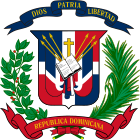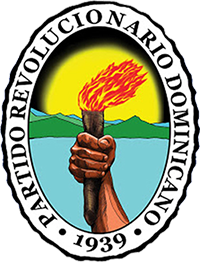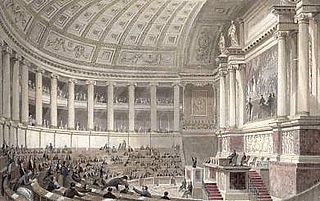 |
|---|
Parliamentary elections were held in the Dominican Republic on 16 May 2006. [1] They were won by the Progressive Bloc led by the Dominican Liberation Party, which took 96 of the 178 seats in the Chamber of Deputies and 22 of the 32 Senate seats.
 |
|---|
Parliamentary elections were held in the Dominican Republic on 16 May 2006. [1] They were won by the Progressive Bloc led by the Dominican Liberation Party, which took 96 of the 178 seats in the Chamber of Deputies and 22 of the 32 Senate seats.

The Dominican Republic is a representative democracy, where the President of the Dominican Republic functions as both the head of the government and head of the multi-party system. Executive power is exercised by the government. Legislative power is vested in the bicameral National Congress. The Judiciary is independent of the executive and the legislature.
A member of parliament (MP) is the representative in parliament of the people who live in their electoral district. In many countries with bicameral parliaments, this term refers only to members of the lower house since upper house members often have a different title. The terms congressman/congresswoman or deputy are equivalent terms used in other jurisdictions. The term parliamentarian is also sometimes used for members of parliament, but this may also be used to refer to unelected government officials with specific roles in a parliament and other expert advisers on parliamentary procedure such as the Senate parliamentarian in the United States. The term is also used to the characteristic of performing the duties of a member of a legislature, for example: "The two party leaders often disagreed on issues, but both were excellent parliamentarians and cooperated to get many good things done."

The Volkskammer was the unicameral legislature of the German Democratic Republic.

The Congress of the Dominican Republic is the bicameral legislature of the government of the Dominican Republic, consisting of two houses, the Senate and the Chamber of Deputies. Both senators and deputies are chosen through direct election. There are no term limits for either chamber.

The Chamber of Deputies is the Lower house of the Congress which, along with the Senate, composes the legislature of the Dominican Republic.

The Senate of the Dominican Republic is the upper house in the bicameral legislature of the Dominican Republic, and together with the Chamber of Deputies makes up the Congress.

The Dominican Revolutionary Party is a political party in the Dominican Republic. Traditionally a left-of-centre party and social democratic in nature, the party has shifted since the 2000s toward the political centre. The party's distinctive color is white. Traditionally, the party has two presidents: the "Titular President" and the "Acting President" ; until 2010 the presidents and the Secretary-General were proscribed to run for any elected office.

The Dominican Republic is a unitary state with elected officials at the national and local levels. On a national level, head of state, the President, is elected directly by the people. The national legislature, the Congress of the Republic, is divided into two chambers: the Chamber of Deputies and the Senate. There are also elected offices at the local level. It is estimated that across the whole country, over four thousand offices are filled in every electoral cycle.

The Legislative Chamber is the lower chamber of the Oliy Majlis of the Republic of Uzbekistan. It has 150 members, 135 elected for a five-year term in single-seat constituencies using the two-round system and previously until the new president came to power, 15 seats were taken by the Ecological Movement of Uzbekistan. Today, the Ecological Movement of Uzbekistan is a full participant, and participates in parliamentary elections as an "Ecological party of Uzbekistan". Elections of deputies to the Legislative Chamber are universal. Citizens of the Republic of Uzbekistan who have reached the age of eighteen by the election day have the right to vote. The citizens who have reached the age of twenty-five by the date of election and have been residing in the Republic of Uzbekistan for at least five years have the right to be elected to the Legislative Chamber. Citizens who are recognized to be incapacitated by the court, as well as persons held in places of detention by a court sentence, cannot be elected and participate in elections.
The Social Democratic Institutional Bloc is a left-wing populist, democratic socialist, social democratic and left-wing nationalist political party in the Dominican Republic.

Chamber of Deputies was a parliamentary body in France in the nineteenth and twentieth centuries:

Parliamentary elections were held in the Dominican Republic on 16 May 2010 to elect the 32 members of the Senate and 183 members of the Chamber of Deputies. Polls forecasted a victory for the Dominican Liberation Party (PLD) of President Leonel Fernández. Before the election, 96 of the 178 Chamber of Deputies seats and 22 of the 32 Senate seats were controlled by the PLD.

General elections were held in the Dominican Republic on 16 May 1942. Rafael Trujillo was the only candidate in the presidential election and was elected unopposed, whilst his Dominican Party won every seat in the Congressional elections. They were the first elections in Dominican history in which women could vote, and three women were elected; Isabel Mayer to the Senate and Milady Félix de L'Official and Josefa Sánchez de González to the Chamber of Deputies.

General elections were held in Dominican Republic on 15 May 2016 to elect a president, vice-president and the Congress, as well as 20 deputies to the Central American Parliament, municipal councils, mayors and vice mayors. On 15 May 2015 Roberto Rosario, president of the Central Electoral Board, said that there would be about 4,300 seats up for election in the "most complex elections in history".

The Alternative Democratic Movement is a political party in the Dominican Republic.

General elections were held in the Dominican Republic on 5 July 2020 to elect a president, vice-president, 32 senators and 190 deputies. They had originally been planned for 17 May, but were postponed due to the coronavirus pandemic. They are the second elections since 1994 in which all positions will be elected simultaneously, and the first in Dominican history in which all authorities will be elected simultaneously and directly.
By-elections are held in Italy whenever a parliamentary seat becomes vacant in either the Chamber of Deputies or the Senate of the Republic. By-elections were introduced by the electoral law of 2017.

The Independents is a political party in the Czech Republic.

Dominicans for Change is a right-wing political party in the Dominican Republic. Founded in 2010, it is defined in its statutes as conservative, democratic and nationalist, and as protecting the social, cultural, institutional and ecological heritage of the Dominican Republic.